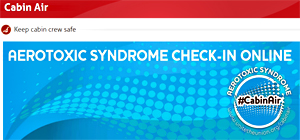Union warnings about the dangers of toxic chemicals inside aircraft have been borne out by a new scientific study conducted in Germany.
Despite reports from aircraft pilots and cabin crew, the airline industry, as is always the case with businesses; have totally ignored the health and safety concerns of their staff and customers.
 Indeed regular flyers are often exposed to aircraft fuel thumes as airlines now regualalry re0fuel their lanes whilst paasenger are embarking and sitting in the passenger cabin. Reports of thumes being drawn into the cabin via the air filtration system as this goes on have been largely ignroed, as the drive for maximisation of profits ensure health and safety concerns are buried and ignored.
Indeed regular flyers are often exposed to aircraft fuel thumes as airlines now regualalry re0fuel their lanes whilst paasenger are embarking and sitting in the passenger cabin. Reports of thumes being drawn into the cabin via the air filtration system as this goes on have been largely ignroed, as the drive for maximisation of profits ensure health and safety concerns are buried and ignored.
Meanwhile scarce media reporting of the incidents which have cost the life of at least one airline pilot, have ignored the fact that it is the Trade Unions and staff of the airlines that have raised these concerns.
Mandatory Occurence Reports - safety reports - submitted by British-registered airlines to the regulator, the Civil Aviation Authority show that between December 2014 and March 2015, serious incidents of smoke or fumes were reported in the cabin on 167 flights.
Earlier this year, Unite called for a public inquiry into ‘aerotoxic syndrome’, with the union raising concerns about both short- and long-term health risks associated with in-air exposures.
Now a study carried out by researchers in Germany has confirmed flight attendants and passengers are exposed to toxins in cabin air.
Researchers from the University of Göttingen tested 140 patients, many of whom were cabin crew, and found organophosphates and volatile organic compounds in their blood and urine samples. The study suggests that these compounds may have been leaked into the cabin air supply from engine fuel, oils or antifreeze.
Organophosphate compounds cause symptoms such as nausea and light-headedness and can attack the nervous system, circulation and airways.
David Robinson of the law firm Thompsons said:
“These latest findings support long-term concerns over aerotoxic syndrome and underline the serious health risks associated with contaminated cabin air. As it stands, there are no official guidelines on what is a ‘safe’ level of exposure for cabin staff and passengers, despite growing concerns around aerotoxic syndrome.”
He added:
“The passenger airline industry must acknowledge the findings of this latest research and a thorough investigation is urgently needed to establish how cabin crew, pilots and passengers can be better protected from the risks of exposure to contaminated cabin air.”
Unite is running a major campaign amongst its cabin crew membership.
 Their website states:
Their website states:
Unite is pursuing over 50 legal cases over aerotoxic syndrome on behalf of cabin crew members, and the number of cases is expected to grow.
In most modern aircraft unfiltered ‘bleed air’ from jet engines is used to supply the cabin, but due to design and in the event of an oil leak, fumes can make their way directly inside the aircraft cabin via the aircraft ventilation system.
The only airliner not to use bleed air is the Boeing 787 Dreamliner. The union is calling on the airline industry to monitor cabin air and for an independent inquiry so that dangers can be fully assessed and investigated in an open forum.
See the full report from ITV News, including an interview with Unite general secretary Len McCluskey here
Source: TUC Risks / Unite / Unionsafety



 Their website states:
Their website states: